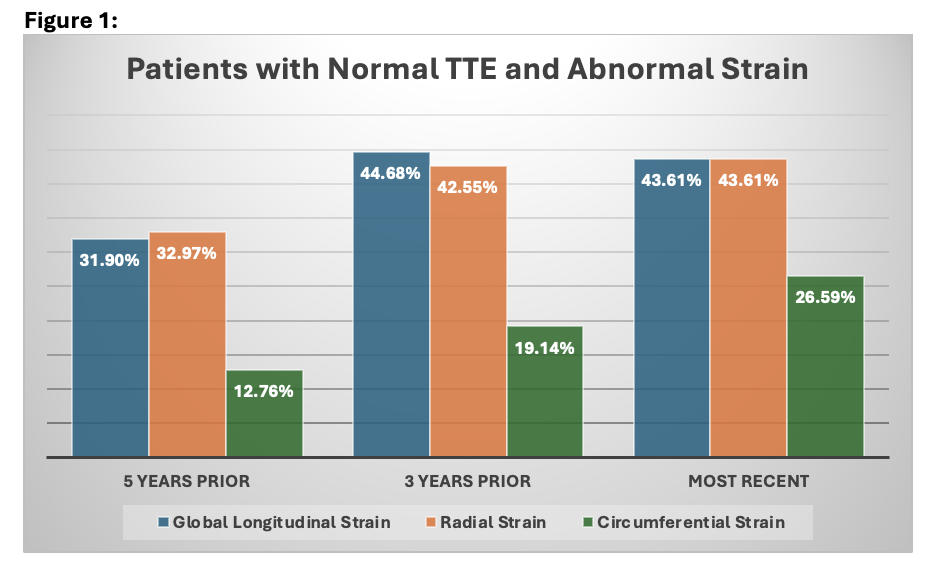Session Information
Date: Sunday, October 26, 2025
Title: (0671–0710) Systemic Sclerosis & Related Disorders – Clinical Poster I
Session Type: Poster Session A
Session Time: 10:30AM-12:30PM
Background/Purpose: Systemic sclerosis (SSc) is a chronic autoimmune rheumatologic disease characterized by fibrosis and vascular complications, which significantly impact various organs, including the heart. Cardiac involvement contributes substantially to morbidity and mortality, yet early myocardial dysfunction often remains undetected due to its asymptomatic nature. While a transthoracic echocardiogram (TTE) is the standard tool for assessing ventricular dysfunction and pulmonary hypertension, it may fail to identify early/subclinical myocardial dysfunction. Strain echocardiography, particularly global longitudinal strain (LVGLS), has emerged as a more sensitive method for detecting early cardiac impairment. However, data on radial and circumferential strain—critical components of multidimensional cardiac function—remain limited. This study evaluates the progression of strain patterns over five years and compares strain echocardiography to conventional TTE.
Methods: A retrospective analysis was conducted on SSc patients (2013 ACR criteria, Table 1) with LV diastolic and/or systolic dysfunction (LVD) who underwent at least three TTEs over the past decade. Strain values were obtained using speckle-tracking echocardiography from the most recent TTE and those from three and five years prior. To ensure consistency, strain measurements were recalculated using TomTec® technology. Patients with incomplete data were excluded. Strain data was analyzed as mean values.
Results: Left ventricular global longitudinal (LVGLS) and circumferential strain (LVGCS) are expressed as a negative percentage, with normal values defined as < -18% (LVGLS) and < -15.3% (LVGCS). Radial strain (LVGRS) is expressed as a positive percentage, with normal values ≥ 25.5%. Over five years, all three mean strain patterns showed progressive decline:LVGLS: -17.1-15.6-14.4LVGCS: -18.8-16.4-14.2LVGRS: 20.618.015.9Notably, 31-44% of patients with normal LV function on conventional TTE (LVEF ≥ 50% and normal diastolic function) exhibited abnormal LVGLS or LVGRS. In contrast, LVGCS aligned more closely with conventional TTE findings (Figure 1). Though all patients in the study were diagnosed with SSc-LVD, 46.8% showed no current LVD based on conventional TTE. This discrepancy may reflect treatment-related normalization of standard TTE parameters.
Conclusion: Global longitudinal and radial strain measurements may outperform circumferential strain in detecting early LVD in SSc patients. These findings support the potential of strain echocardiography as a valuable, routine screening tool that may enable earlier intervention and improve patient outcomes compared to conventional TTE.
 Table 1: Patient Characteristics
Table 1: Patient Characteristics
.jpg) Figure 1: Patients with Normal TTE and Abnormal Strain
Figure 1: Patients with Normal TTE and Abnormal Strain
To cite this abstract in AMA style:
Abdalla J, Okushi Y, Popovic Z, Wassif H, Chatterjee S. Global Longitudinal, Circumferential, and Radial Strain in Systemic Sclerosis Patients with Left Ventricular Dysfunction [abstract]. Arthritis Rheumatol. 2025; 77 (suppl 9). https://acrabstracts.org/abstract/global-longitudinal-circumferential-and-radial-strain-in-systemic-sclerosis-patients-with-left-ventricular-dysfunction/. Accessed .« Back to ACR Convergence 2025
ACR Meeting Abstracts - https://acrabstracts.org/abstract/global-longitudinal-circumferential-and-radial-strain-in-systemic-sclerosis-patients-with-left-ventricular-dysfunction/
